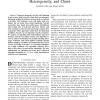Free Online Productivity Tools
i2Speak
i2Symbol
i2OCR
iTex2Img
iWeb2Print
iWeb2Shot
i2Type
iPdf2Split
iPdf2Merge
i2Bopomofo
i2Arabic
i2Style
i2Image
i2PDF
iLatex2Rtf
Sci2ools
124
click to vote
INFOCOM
2005
IEEE
2005
IEEE
Distributed, secure load balancing with skew, heterogeneity and churn
— Numerous proposals exist for load balancing in peer-to-peer (p2p) networks. Some focus on namespace balancing, making the distance between nodes as uniform as possible. This technique works well under ideal conditions, but not under those found empirically. Instead, researchers have found heavy-tailed query distributions (skew), high rates of node join and leave (churn), and wide variation in node network and storage capacity (heterogeneity). Other approaches tackle these less-than-ideal conditions, but give up on important security properties. We propose an algorithm that both facilitates good performance and does not dilute security. Our algorithm, kChoices, achieves load balance by greedily matching nodes’ target workloads with actual applied workloads through limited sampling, and limits any fundamental decrease in security by basing each nodes’ set of potential identifiers on a single certificate. Our algorithm compares favorably to four others in trace-driven simulation...
Actual Applied Workloads | Communications | Heavy-tailed Query Distributions | INFOCOM 2005 | Load Balancing |
Related Content
| Added | 25 Jun 2010 |
| Updated | 25 Jun 2010 |
| Type | Conference |
| Year | 2005 |
| Where | INFOCOM |
| Authors | Jonathan Ledlie, Margo I. Seltzer |
Comments (0)

